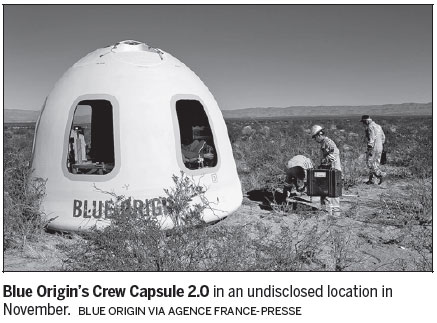First space tourist flight on the way
$250,000 needed to experience zero-gravity for several minutes
WASHINGTON - The two companies leading the pack in the pursuit of space tourism have said that they are only months away from their first out-of-this-world passenger flights - though neither has set a firm date.
Virgin Galactic, founded by British billionaire Richard Branson, and Amazon creator Jeff Bezos' Blue Origin, are racing to be the first to finish their tests - with both using radically different technology.

Neither Virgin nor Blue Origin's passengers will find themselves orbiting the Earth: Instead, their weightless experience will last just minutes. It's an offering far different from the first space tourists, who paid tens of millions of dollars to travel to the International Space Station in the 2000s.
Having paid for a much cheaper ticket - costing $250,000 with Virgin, as yet unknown with Blue Origin - the new round of space tourists will be propelled dozens of kilometers into the atmosphere, before coming back down to Earth. By comparison, the ISS is in orbit 400 km from our planet.
The goal is to approach or pass through the imaginary line marking where space begins - either the Karman line, at 100 km, or the 80-km boundary recognized by the US Air Force.
At this altitude, the sky looks dark and the curvature of the earth can be seen clearly.
Virgin Galactic
With Virgin Galactic, six passengers and two pilots are boarded onto SpaceShipTwo VSS Unity, which resembles a private jet.
The VSS Unity will be attached to a carrier spacecraft - the WhiteKnightTwo - from which it will then detach at around 15,000 meters. Once released, the spaceship will fire up its rocket, and head for the sky.
Then, the passengers will float in zero-gravity for several minutes, before coming back to Earth at Virgin's "spaceport" in the New Mexico desert.
In total, the mission lasts between 90 minutes and two hours. Branson said in May that he hoped to himself be one of the first passengers in the next 12 months. Around 650 people make up the rest of the waiting list, Virgin said.
Blue Origin
Blue Origin has developed a system closer to the traditional rocket: The New Shepard.
On this journey, six passengers take their place in a "capsule" fixed to the top of a 18.3-meter-long rocket. After launching, it detaches and continues its trajectory several kilometers toward the sky. During an April 29 test, the capsule made it 106 km.
After a few minutes of weightlessness, during which passengers can take in the view through large windows, the capsule gradually falls back to earth with three large parachutes and retrorockets used to slow the spacecraft.
From takeoff to landing, the flight took 10 minutes during the latest test.
Until now, tests have only been carried out using dummies at Blue Origin's West Texas site. But one of its directors, Rob Meyerson, said in June the first human tests would come "soon".
Associated Press
(China Daily 07/14/2018 page9)














